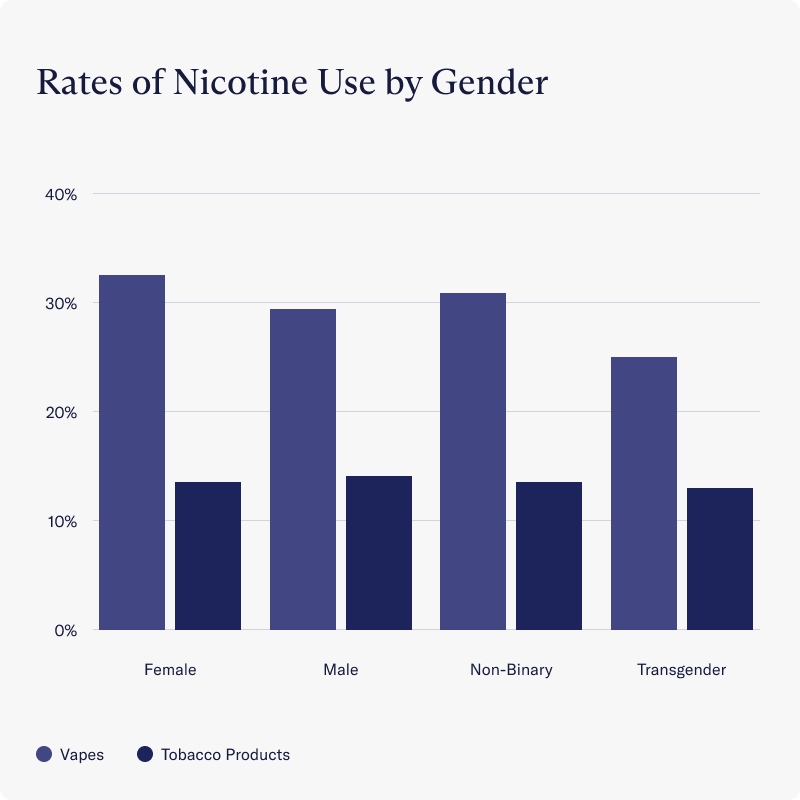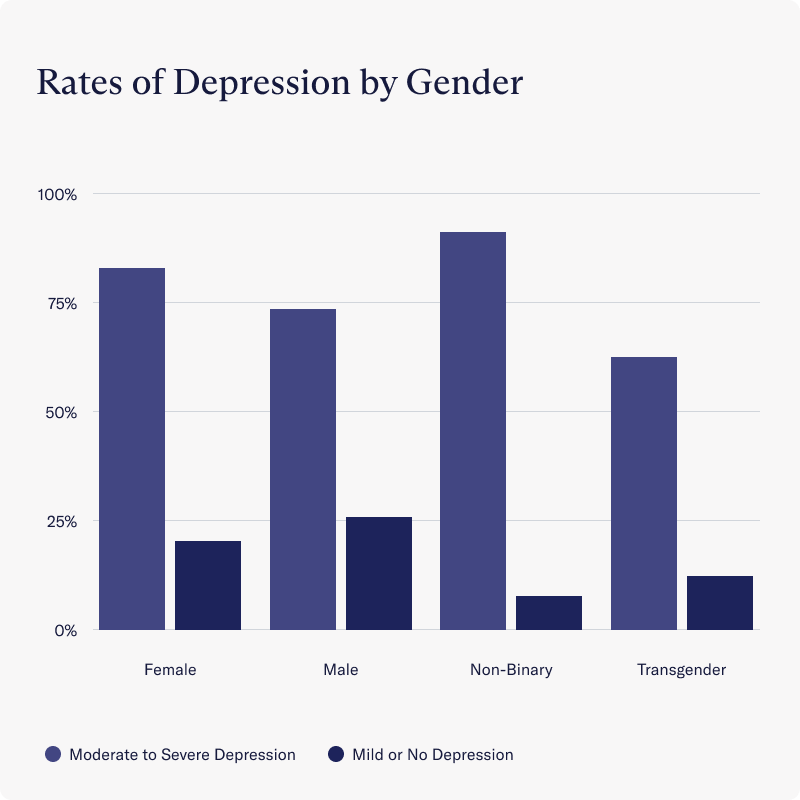
Table of Contents
The Impacts of Nicotine on Depression

Written By: Colin Crouse

Clinically Reviewed By: Dr. Kate Gliske
April 21, 2023
7 min.
Charlie Health’s Research and Outcomes team takes a deep dive into the relationship between nicotine use and depression. The major takeaway? Nicotine seriously exacerbates symptoms of depression, especially in teens and young adults.
Learn more about our Clinical Review Process
Table of Contents
What is nicotine?
Nicotine is found in a variety of products such as cigarettes, chewing tobacco, and electronic cigarettes, also referred to as “vapes.” Nicotine is one of the top five most addictive drugs in the world, alongside cocaine, heroin, alcohol, and methamphetamine. While the use of traditional tobacco products such as cigarettes has decreased over the past few years, new nicotine products such as vapes and nicotine lozenges have risen in popularity, especially among young people. In fact, vapes are the most commonly used nicotine product among American youth today.
What is depression?
Depression is one of the most common mental health conditions in America and often goes untreated or under-diagnosed. Depression can negatively impact a person’s thoughts, feelings, and behavior. Depression can also alter the way a person perceives the world around them, often resulting in a lack of or reduced functioning. While its effects may be severe, depression is very common, affecting 17% of youth between the ages of 12 and 17, according to the National Institute of Mental Health.
Depression is associated with a multitude of both physical and psychological symptoms, which may differ based on a variety of factors. While everyone experiences depression differently, its most common symptoms include:
- Feeling sad, empty or hopeless
- Irritability
- Loss of interest in hobbies or activities that you previously enjoyed
- Trouble sleeping at night or sleeping too much
- Feeling lethargic or having a lack of energy.
- Reduced appetite and weight loss, or overeating and weight gain
- Anxious thoughts
- Slowed speech, thinking, or movement
- Feelings of guilt or worthlessness
- Trouble with memory or concentration
- Thoughts of killing or harming yourself
- Dissociative episodes
The interactions among nicotine, dependency, and depression
Previous research has established a direct link between depression, nicotine use, and nicotine dependence. Individuals with depression who also consume nicotine tend to do so earlier in the day than non-depressed people. They are more likely to use nicotine throughout the day in higher volumes.
Since depressed vapers and smokers tend to consume more nicotine on average than non-depressed nicotine users, they are naturally at an increased risk of nicotine dependence. This is especially true for young adults and adolescents whose brains continue to develop well into their 20s.
Studies have shown that exposure to nicotine while the brain is still developing puts an individual at a significantly higher risk of experiencing the psychological and physical repercussions of nicotine use. Additionally, one study found that depressed individuals were more likely to engage in what’s known as “self-medication” with nicotine, which may further contribute to their dependence.
Many depressed people suffer from low levels of dopamine, a neurotransmitter that plays a key role in how we feel pleasure. When consumed, nicotine floods the brain with dopamine, leading to short-term feelings of pleasure and happiness. These feelings of pleasure and relief brought on by nicotine could possibly be an explanation as to why many depressed people start using nicotine in the first place. This might appear to be an easy fix for those with depression. Unfortunately, using nicotine in an attempt to balance one’s dopamine levels or mood can have serious long-term repercussions.
Long-term nicotine use may cause an individual’s dopamine receptors in the brain to burn out. This means individuals who use nicotine frequently over a long period of time may notice a reduction in the feelings of pleasure and happiness they once experienced from nicotine. Dopamine burnout can often lead to or exacerbate depression.
While long-term nicotine use may lead to dopamine burnout, studies have found the opposite to be true for those who quit nicotine. One study found individuals who quit nicotine experienced a “bounce back” in their dopamine levels within 3 months of quitting when compared to those who did not quit nicotine. So while individuals may not experience an immediate reduction in depressive symptoms when they initially quit, they are likely to feel less depressed over time as their dopamine receptors begin to recover.
Nicotine withdrawal and depression
While nicotine withdrawal, on average, lasts between 2-4 weeks, its symptoms may last longer based on how long someone has been using nicotine as well as their level of dependence. Furthermore, the DSM-5 ranks depressed mood among the top seven most common symptoms of nicotine withdrawal. An experimental study also found that highly depressed people can experience the symptoms of nicotine withdrawal more intensely than non-depressed individuals, even when they’re in the same stages of withdrawal.
Since depression is one of the main symptoms of and can exacerbate nicotine withdrawal, many of those with depression who are nicotine-dependent are often deterred from quitting nicotine for fear their depression may worsen. This is especially true for those who are using nicotine to self-medicate.
While depressed individuals who quit nicotine may notice their depression has worsened in the short term, research has shown the opposite is true for those who remain abstinent from nicotine for prolonged periods of time. A 2012 study found that depressed people who were not dependent on nicotine improved at a faster rate than those who were nicotine-dependent over a two-year period. So while at first, individuals may experience increased depressive symptoms and distress, those who quit nicotine will benefit more from an overall improvement to their mental health in the long run.
Charlie Health data: Teens, depression, and vaping
Previous research has established associations between nicotine consumption and increased depressive symptoms among youth and young adults. Charlie Health is a nationwide virtual IOP program for youth and young adults (aged 12-30) struggling with a variety of mental health disorders, including major depressive disorder and generalized anxiety disorder. Charlie Health collects a variety of data from clients in an effort to provide the highest quality personalized care possible.
In a sample of approximately 1,250 teens and young adults who were admitted and discharged from Charlie Health between October 2022 and March 2023. Only individuals that completed an intake and discharge survey upon entering and leaving the program were included in this sample.
The majority of all clients screened positive for depression upon intake (73.1%; PHQ-9 score ≥ 10).
Prevalence of nicotine use among all Charlie Health youth at intake:
- 25.9% of all clients (aged 11-30) reported e-cigarette use at intake
- 14.5% of clients reported using traditional tobacco products at intake
In order to understand the impact of nicotine on depression scores at intake and discharge, a variable was created combining e-cigarette use with tobacco use given that the majority of e-cigarettes contain nicotine. Combined, we determined that 30.4% of all clients at Charlie Health reported consuming some form of nicotine in the last 30 days prior to intake. 21.7% of clients were classified as infrequent users, while 8.7% were deemed to be frequent or daily users.
Differences in depression symptoms at treatment entry by nicotine use status:
- There were no differences in depression symptoms between those who reported using nicotine frequently (n = 101, M = 14.63, SD = 6.40) and those who reported not using nicotine products in the last month (n = 808, M =14.19, SD = 6.89), t(907) = -.611, p = .54
Differences in depression symptoms at treatment discharge by nicotine use status:
- A significant difference emerged at discharge for those who reported frequently using nicotine products. Youth and young adults who reported frequent or daily nicotine use (n=72) reported significantly higher depressive symptoms at discharge (M = 10.81, SD = 6.03) than those who reported no nicotine use (n=882, M = 7.82, SD = 5.91), t(952) = -4.12, p < .001.


Conclusion
Nicotine is one of the world’s most addictive drugs and is extremely popular among America’s youth. Previous studies have established a significant relationship between nicotine use and depression. Many depressed individuals self-medicate with nicotine to cope with the symptoms of their depression, only to find out they have worsened in the long run.
Studies have shown depressed people who vape or smoke tend to use nicotine earlier in the day and in higher quantities than non-depressed individuals, which further contributes to their dependence on the drug.
Nicotine withdrawal has also been found to be a significant risk factor for those with depression. Not only is depression one of the most common symptoms of nicotine withdrawal, but studies suggest depression can also affect how severely people experience withdrawals. Those who are already struggling with depression may feel the effects of nicotine withdrawal more intensely than those who are not. This may be one of the driving factors which deter nicotine users with depression from quitting, especially among those who are using nicotine products to self-medicate.
Here at Charlie Health, we found that clients who frequently used nicotine had significantly higher depressive symptoms at discharge than those who were not using nicotine products. This finding is concurrent with other research which found nicotine use may exacerbate the symptoms of depression and contribute to prolonged recovery times in depressed individuals that are nicotine-dependent.
If you vape or smoke cigarettes and struggle with depression, you may want to consider stopping your nicotine use in order to optimize your treatment or improve your chances of recovering from depression in the long run. Receive support and get started with our virtual intensive therapy program here.
References
England, L. J., Bunnell, R. E., Pechacek, T. F., Tong, V. T., & McAfee, T. A. (2015). Nicotine and the Developing Human: A Neglected Element in the Electronic Cigarette Debate. American Journal of Preventive Medicine, 49(2), 286–293. https://doi.org/10.1016/j.amepre.2015.01.015
Lerman, C., Audrain, J., Orleans, C. T., Boyd, R., Gold, K., Main, D., & Caporaso, N. (1996). Investigation of mechanisms linking depressed mood to nicotine dependence. Addictive Behaviors, 21(1), 9–19. https://doi.org/10.1016/0306-4603(95)00032-1
Bishop, S. (2012, February 24). How Do Smoker’s Brains Change in Response to High Nicotine Levels? Mayo Clinic News Network. https://newsnetwork.mayoclinic.org/discussion/smokers-brains-change-in-response-to-high-levels-of-nicotine/
Brain chemical dopamine bounces back after quitting smoking. (2016, August 10). Reuters. https://www.reuters.com/article/us-health-dopamine-smoking-idUSKCN10L2LQ
McLaughlin, I., Dani, J. A., & De Biasi, M. (2015). Nicotine Withdrawal. Current Topics in Behavioral Neurosciences, 24, 99–123. https://doi.org/10.1007/978-3-319-13482-6_4
Pomerleau, O. F., Pomerleau, C. S., Mehringer, A. M., Snedecor, S. M., Ninowski, R., & Sen, A. (2005). Nicotine Dependence, Depression, and Gender: Characterizing Phenotypes Based on Withdrawal Discomfort, Response to Smoking, and Ability to Abstain. Nicotine & Tobacco Research, 7(1), 91–102. https://doi.org/10.1080/14622200412331328466
Jamal, M., Willem Van der Does, A. J., Cuijpers, P., & Penninx, B. W. J. H. (2012). Association of smoking and nicotine dependence with severity and course of symptoms in patients with depressive or anxiety disorder. Drug and Alcohol Dependence, 126(1), 138–146. https://doi.org/10.1016/j.drugalcdep.2012.05.001


